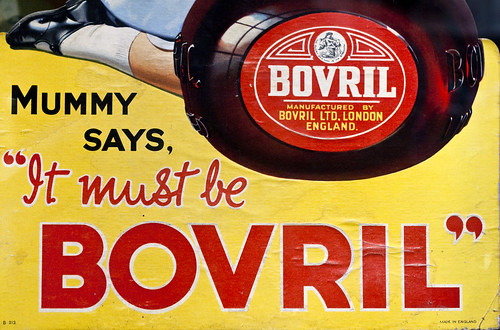
As reported in the Daily Mail, a cup of Bovril may be an important ingredient in a new diet that can reduce the risk of breast cancer. Photo - Flickr: Dave Knapik
Last October the Daily Mail printed an article with the headline: “Strict diet two days a week cuts risk of breast cancer by 40 per cent’”. The article cites a study published in the International Journal of Obesity, called: “The effects of intermittent or continuous energy restriction on weight loss and metabolic disease risk markers: a randomized trial in young overweight women.” Reading these two titles, it’s hard to tell exactly how they’re related. Surely, if the researchers had discovered that the two day a week diet reduced the risk of breast cancer they would have mentioned it in their article’s title.
In fact, the study, published in the International Journal of Obesity, was about WEIGHT LOSS, not breast cancer. It was a six-month study, that put 100 overweight young women on one of two diets and looked at how those two diets affected weight loss. The only mention of breast cancer in the study was that over the course of the six months the levels of two breast cancer related hormones were measured. The Daily Mail was quick to pick up on this measurement and used it to write their article.
The Daily Mail took a big leap when they claimed that the two day a week diet could reduce the risk of breast cancer, given the study never looked at breast cancer risk. However, to be fair, they did admit this in the 19th paragraph where they wrote:
Dr Julie Sharp, senior science information manager at Cancer Research UK, said: ‘This study is not about breast cancer, it’s a study showing how different diet patterns affect weight loss and it’s misleading to draw any conclusions about breast cancer from this research.’
After 18 paragraphs explaining how this diet could reduce risk of breast cancer, this small disclaimer is too little, too late.
The Daily Mail didn’t get away with their misleading publication. The Cancer Research UK blog responded with the post: ““Breast cancer diet” story based on research that wasn’t about breast cancer.” Here they explain why this study does not support the claims made in the Daily Mail.
A week later, Ben Goldacre, of the series “Bad Science” in the Guardian UK, responded with his piece: “The Daily Mail cancer story that torpedoes itself in paragraph 19.” Goldacre focuses his on the fact that 19th paragraph disclaimers aren’t enough to make up for a misleading headline and article. Citing studies on how people read, Goldacre says that most people don’t read entire articles. Most of the Daily Mail’s readers probably never made it to the 19th paragraph.
This shows the importance of looking into news stories. Fortunately, the responses to the Daily Mail article quickly put the truth out there, and anyone who Googled the claim would quickly come across the reality of the research.
